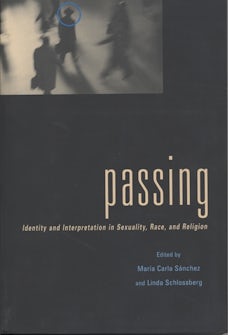Passing: Identity and Interpretation in Sexuality, Race, and ReligionPosted in Anthologies, Books, Gay & Lesbian, Literary/Artistic Criticism, Media Archive, Passing, Religion on 2015-12-28 21:17Z by Steven |
Passing: Identity and Interpretation in Sexuality, Race, and Religion
New York University Press
August 2001
283 pages
5 illustrations
Cloth ISBN: 9780814781227
Paper ISBN: 9780814781234
Edited by:
María C. Sánchez, Associate Professor of English
University of North Carolina, Greensboro
Linda Schlossberg, Lecturer on Studies of Women, Gender, and Sexuality
Harvard University
Passing for what you are not—whether it is mulattos passing as white, Jews passing as Christian, or drag queens passing as women–can be a method of protection or self-defense. But it can also be a uniquely pleasurable experience, one that trades on the erotics of secrecy and revelation. It is precisely passing’s radical playfulness, the way it asks us to reconsider our assumptions and forces our most cherished fantasies of identity to self-destruct, that is centrally addressed in Passing: Identity and Interpretation in Sexuality, Race, and Religion.
Identity in Western culture is largely structured around visibility, whether in the service of science (Victorian physiognomy), psychoanalysis (Lacan’s mirror stage), or philosophy (the Panopticon). As such, it is charged with anxieties regarding classification and social demarcation. Passing wreaks havoc with accepted systems of social recognition and cultural intelligibility, blurring the carefully-marked lines of race, gender, and class.
Bringing together theories of passing across a host of disciplines—from critical race theory and lesbian and gay studies, to literary theory and religious studies—Passing complicates our current understanding of the visual and categories of identity.
Contributors: Michael Bronski, Karen McCarthy Brown, Bradley Epps, Judith Halberstam, Peter Hitchcock, Daniel Itzkovitz, Patrick O’Malley, Miriam Peskowitz, María C. Sánchez, Linda Schlossberg, and Sharon Ullman.

